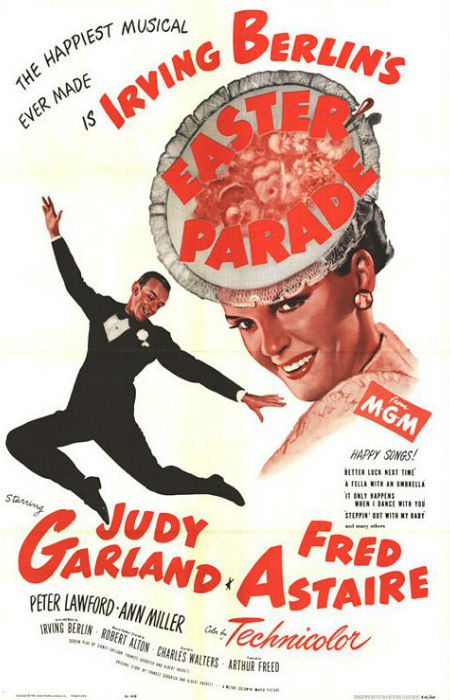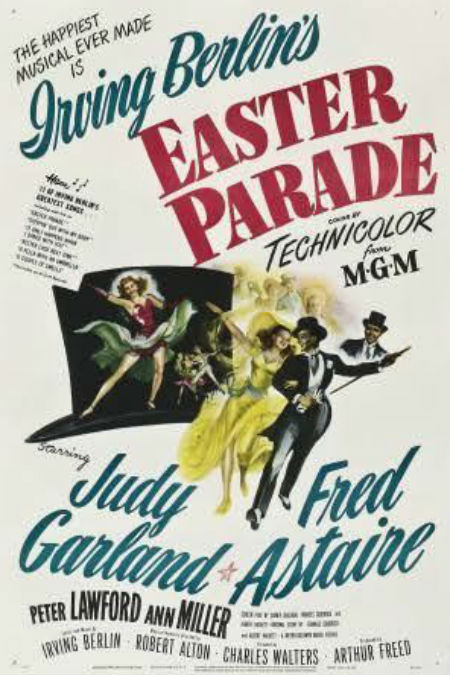
Love has a great many homes in popular culture – chart-topping songs, poems, TV dramas and sitcoms, books of all genres; honestly, we could happily go on and on and on, so romantically omnipresent is love wherever you turn.
But perhaps its most natural home, and the one in which it is celebrated with much fervour, not just in word but song, is the musical, where the entire narrative arc, in just about every conceivable way, is given to make sure that the course of true love, even in the face of spot-on Shakespearian truisms aside, does finally run smooth.
That doesn’t mean, of course, that Shakespeare is routinely ignored; in fact, in the 1948 Charles Walters-directed Easter Parade, he is embraced in the kinds of ways that makes musicals such a torturous joy to watch.
The most successful film for both Fred Astaire, who stars (replacing an injured Gene Kelly) as Broadway star Don Hewes, and Judy Garland who played the part of his revenge dancer project Hannah Brown, Easter Parade perfectly embodies the great journey we all go on when we plunge into a musical where love reigns supreme (which, let’s be fair, is most of them).
Even though we all know how it ends, and just as importantly, who it ends with, the film does such a great job of playing with our emotional investment, thanks to Garland in particular who is perfectly-cast as an unknown bar dancer plucked to heavily-tutored fame by Hewes, that we are there for every twist and turn of its Cupid-fraught plot.
It starts, as it must, with a break up – Hewes, who spends the opening sequence singing “Happy Easter” to everyone (they happily sing back, naturally) as he dances in and out of various stores buying hats and pink, plush Easter bunnies, a retinue of porters trailing behind him with his many purchases, comes home, breathless with excitement to find his great love, partner in dance and life, is leaving him.
Taken, like Brown to come, out of an anonymous chorus line and elevated under Hewes’ tutelage to Broadway hoofing royalty – she is the star of the Easter Sunday titular parade where men but especially women stride up and down Fifth Avenue in their finest, seeking to be photographed and featured in all the best publications – Nadine (Ann Miller) has signed a lucrative contract with the Siegfried Follies who plan to make her a glamorous solo star.
Though Hewes tries to win her back with, yes, another song, this time “It Only Happens When I Dance With You”, which features a couple more times in the film, she only has eyes for her big solo break and Don’s best friend, rich boy Johnny (Peter Lawford), who ends up, as the musical demands he must, as the bridegroom, never the groom.
Thus the stage is set, with appropriate angst and great swirls of conflicting emotion, for Hewes to go out and start all over again, his sole aim at first, to prove to Nadine, that he can take anyone to dancing glory.
Poor Hannah – she has no idea as she dances out onto the stage in a chorus line at the watering hole where Hewes has decided to drown his sorrows, that she is simply a rebound project, one designed solely to win Nadine back.
She throws herself into Hewes intense regime of training with gusto, after some initial reluctance, convinced that her new dance partner has only the very best of intentions and the future is laid with roses and romantically mutually-satisfying happiness.
It does, of course since this is a musical, and a damn fine one at that, where the outcome is foregone before the first note is sung; but getting there is as agonising as any other musical you’ve sat through with a faking romance involving Johnny, a fruit stand umbrella and an abortive date, misunderstandings, a massive lack of self-awareness – I’m looking at you Hewes – and usual kind of almost-there-but-not-quite romantic agonies of which life has few but musicals have, thankfully for us, many.
You know all these ups and downs, ins and outs and twists and turns are lying in wait, but Astaire and Garland make such a convincing pair, even before romance finally gets to show its true face, that you go along with every narrative fake out with gusto, willing Hewes to realise that Brown, who comes alive in Garland’s performance as a person of passion, vulnerability and pure intent (unlike Nadine who is, well, not), is far more than a rebound project.
It takes him a while, as you might expect, which is a good thing since we have a heady slew of 17 Irving Berlin songs – only 16 originally appeared in the film as one number, “Mr. Monotony” was seen as far too risqué for a film set in 1912; it now lives in subsequent DVD releases – all of which are rich with his trademark melody, gift for extraordinarily-captivating and clever rhymes and heartfelt emotion.
Featuring songs like “Steppin’ Out With My Baby”, “We’re a Couple of Swells” and “Easter Parade”, the film is a feast of sumptuous singing, pinpoint perfect routines and the kind of chemistry which makes you believe that the musically-heightened world which Hewes and Brown inhabit is one as real as the banal one in which the audience, alas, find themselves trapped.

The poster breathlessly-describes Easter Parade as “the happiest musical ever made” and while you may beg to differ given how many joy-filled musicals there are out there now, it must come pretty close.
Sure, there is existential angst and suffering, pain and sorrow, romance ending and careers going their separate ways; but there’s also enormous amounts of promise and hope, true love and careers reborn in there too, such that there is no doubt at any stage of an unexpectedly-complicated narrative that love will not only find its real home but move in there for good.
Watching “Easter Parade”, where life isn’t perfect but the chance for it to be is, you are swept up in all the possibilities that love offers, set in a world in which every moment is accompanied by fabulous clothes, astonishingly-beautiful flower arrangements and lives where time is so gloriously-elastic that it is possible to put on a major dance revue such as Hewes and Brown’s “Walking up the Avenue” and still have time to catch a show, though you shouldn’t right Hewes, at the Siegfriend Follies.
In so far as Easter Parade captures the magical escapism and lush romanticism of musicals to an almost-unchallengable degree, it is likely the happiest musical out there, a delicious reminder that real life might be less than exciting or fulfilling at times but that its counterpart in the musicals is so full of love, hope and possibility, with a few obstacles thrown in because otherwise what is the point, that falling into it and not looking back is probably the kindest thing you can ever do for yourself.